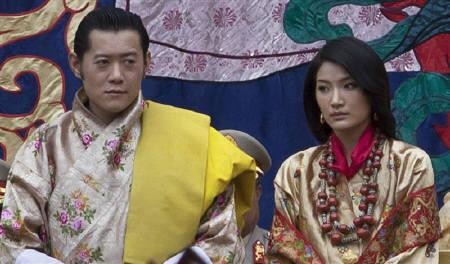
The tiny Himalayan kingdom of Bhutan began voting Tuesday for the lower house "National Council" only for the second time, five years after the country became a Democratic Monarchy in a historic move that saw the king voluntarily stepping down from his absolute power. The voting will follow the more important election for the National Assembly in June in which a political party will be elected as the new government.
Citizens of the tiny nation that proudly touts of initiating the economic system of "Gross National Happiness" that propels the need of amassing collective happiness as more vital than accruing wealth as demonstrated by the policy of "Gross Domestic Product", lined up in long queues Tuesday to choose members of the National Council.
In the following weeks, the nation will decide which of the five parties formed will best befit to shoulder the next government as members of the second ever Bhutanese National Assembly.
The National Council for which the country voted Tuesday is a non-party body of the Parliament of Bhutan which has 25 members - 20 of whom were elected on the latest voting, and 5 more to be elected by the King. Established in 2008 under Article 11 of the Constitution of Bhutan, the Council has both legislative and review functions and is also sometimes called the "House of Review".
There were 67 candidates contesting for seats in the National Council of which people casted their votes for 20 councillors. Fourteen of the contestants were former councillors, while only six of them made it to the seats.
The National Newspaper of Bhutan, Kuensel, reported that only about 45.17 percent of the elegible electorate went to polls to vote for the 20 representatives. That means only about 171,564 of the total 379,819 registered voters actually voted.
"We expected better (performance)," chief election commissioner Dasho Kunzang Wangdi told the newspaper. "But then, given the series of elections people had to participate in, people do not accord that much importance to National Council as they would to National Assembly Elections."
The voting for the National Assembly will be held in June which is another body of three main bodies of the Parliament of Bhutan. The third "body" is the King himself whom the nation refers to as "Druk Gyalpo".
Thirty-two-year-old King Jigme Khesar Namgyel Wangchuck took over the throne in 2006 as the fifth king, after his father Jigme Singye Wangchuck voluntarily abdicated his power. He ruled the country since 1972.
The fourth monarch is best known to have come up with the idea of Gross National Happiness that proposes the need for governments to accelerate towards achievement of happiness through a government policy that exercises both a holistic approach towards governance and an effective measure to achieve economic prosperity.
The Buddhist nation merited a unanimous applaud from over 800 enthused audiences in a recent meeting in the U.N, in which the country sponsored resolution 65/309 called "Happiness: Towards a Holistic Approach to Development".
Inspired by the eccentric Bhutanese philosophy that categorically renounces GDP as an inefficient yardstick to measure happiness and declares firmly the need for a more balanced approach that is marked by an amalgamation of economic prosperity and spiritual values, the U.N. General Assembly declared March 20 to be celebrated as "International Day of Happiness" every year.


!['Kaise ho bhai..': PM Modi shook hands with Akshay Kumar at a media summit in Delhi [Watch] 'Kaise ho bhai..': PM Modi shook hands with Akshay Kumar at a media summit in Delhi [Watch]](https://data1.ibtimes.co.in/en/full/806317/kaise-ho-bhai-pm-modi-shook-hands-akshay-kumar-media-summit-delhi-watch.jpg?w=220&h=135&l=50&t=40)


!['Kaise ho bhai..': PM Modi shook hands with Akshay Kumar at a media summit in Delhi [Watch]](https://data1.ibtimes.co.in/en/full/806317/kaise-ho-bhai-pm-modi-shook-hands-akshay-kumar-media-summit-delhi-watch.jpg?w=220&h=138)








!['Kaise ho bhai..': PM Modi shook hands with Akshay Kumar at a media summit in Delhi [Watch]](https://data1.ibtimes.co.in/en/full/806317/kaise-ho-bhai-pm-modi-shook-hands-akshay-kumar-media-summit-delhi-watch.jpg?w=220&h=135)


